Order of the Southern Cross
| National Order of the Southern Cross | |
|---|---|
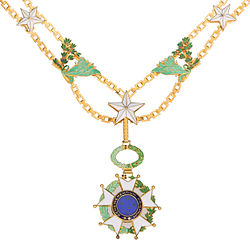 Grand Collar of the National Order of the Southern Cross | |
| Awarded by the Government of Brazil and the Brazilian Imperial Family | |
| Type | National Order and dynastic order |
| Motto | Benemerentium Præmium[1] |
| Eligibility | Foreign nationals[2] |
| Awarded for | "As a token of gratitude and recognition for those who have rendered significant service to the Brazilian nation."[2] |
| Status | Currently awarded |
| Founder | Pedro I of Brazil |
| Grand Master | The President of Brazil[3] (the national order) |
| Chancellor | The Minister of Foreign Affairs[3] |
| Grades | Grand Collar Grand Cross Grand Officer Commander Officer Knight |
| Statistics | |
| First induction | December 1, 1822[4] |
Ribbon bar of the National Order of the Southern Cross | |
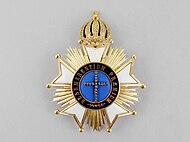
The National Order of the Southern Cross (Portuguese: Ordem Nacional do Cruzeiro do Sul) is a Brazilian order of chivalry founded by Emperor Pedro I on 1 December 1822. The order aimed to commemorate the independence of Brazil (7 September 1822) and the coronation of Pedro I (1 December 1822).[5] The name derives from the geographical position of the country, under the constellation of the Southern Cross and also in memory of the name – Terra de Santa Cruz (Land of the Holy Cross) – given to Brazil following its first arrival by Europeans in 1500.[4]
History
[edit]Originally known as the Imperial Order of the Cross (Portuguese: Ordem Imperial do Cruzeiro), the Order was created by Emperor Pedro I on the day of his Coronation, 1 December 1822. Also on the same date the first knights of the order were appointed, to commemorate the crowning of the Empire's first monarch. After the proclamation of the independence of Brazil on 7 September 1822 other honorific awards had been made, but of the Orders of chivalry shared with Portugal, Brazilian branches of which had been created upon independence; the Order of the Cross, created to mark the Coronation of the Empire's founder, was thus also the first purely Brazilian Order.
After the fall of the monarchy, Brazil's first republican Constitution, enacted on 24 February 1891, abolished all titles of nobility and all Imperial Orders and decorations.[4] The Order was later re-established by the government of Getúlio Vargas on December 5, 1932, as the National Order of the Southern Cross.[4]

During the Old Republic period (from the Proclamation of the Republic until the Revolution of 1930), National Orders did not exist and the Brazilian State bestowed only military medals.[6] Restored in 1932, the Order of the Southern Cross was the first Order to be created in the re-established, republican honours system. It is considered the senior Brazilian National Order.
During the Imperial period, the Order of the Southern Cross was not the highest ranking of the Imperial Orders, as it ranked below the Brazilian branches of the ancient orders of chivalry, that originated with Portugal: the Order of Christ (the senior-most Order), the Order of Saint Benedict of Aviz and the Order of St. James of the Sword. Those Orders were shared by Brazil and Portugal; the Order of Christ was shared with the Holy See similar to the Austrian and a Spanish Orders of the Golden Fleece. However among the Brazilian created Orders, the Imperial Order of the Cross ranked first, having higher status than the Imperial Order of Pedro I and the Imperial Order of the Rose.
The Imperial Order of the Cross continues to be used by both branches of the Brazilian Imperial Family as a House Order, awarded by the rival claimants to the position of Head of the Imperial Family, but such awards are not recognized by the Republic of Brazil.
Just like the Emperors of Brazil were ex officio Grand Masters of the Imperial Order, Presidents of Brazil are ex officio Grand Masters of the successor National Order. Accordingly, President Luiz Inácio Lula da Silva is the Order's current Grand Master.
Criteria
[edit]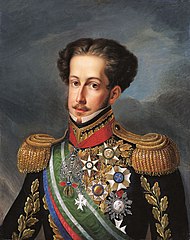


Unlike the Imperial Order, that was awarded to Brazilians and foreigners alike, the republican National Order is awarded to foreigners only. When the Order was re-established in by presidential decree on January 13, 1932,[7] it was restricted to foreigners only with the stipulation that all awards of the Order constitute an act of foreign relations on the part of the Brazilian Government.[8]

Brazilians were excluded deliberately. In the Old Republic, the State regarded Orders and decorations as contrary to the principles of republicanism, and thus maintained no honours system; the creation of an Order that would admit Brazilians to its ranks was a step too far. However, the Brazilian State also resented the lack of a decoration with which to honour foreign dignitaries, as is sometimes almost required by diplomatic protocol. For instance, during the celebrations of the Centennial of Brazilian Independence in 1922, several foreign dignitaries, including the King and Queen of the Belgians, came to Brazil for the celebrations. The King of the Belgians bestowed Belgian honours to some Brazilians. Brazilian nationals needed authorization from the Government to accept foreign titles of honour, or else face loss of citizenship, and under normal circumstances permission for the acceptance of appointment to Orders of Chivalry would not have been granted. While the government of Brazil relaxed its practice and authorized both accepting induction into foreign Orders and the wearing of foreign insignia, it lacked any decorations with which to reciprocate the Belgian gesture. The National Order of the Southern Cross was intended as an Order that would fill that gap. Today, accepting foreign honours and insignia without the need of prior Government approval is allowed, and several Brazilian Orders have been established to which Brazilians may be admitted, starting with the National Order of Merit (Ordem Nacional do Mérito), created in 1946. Even so, the governing statutes of the National Order of the Southern Cross have never been reformed, and it thus remains unavailable to Brazilians. Paradoxically, therefore, the Order's Grand Master — the sitting President of the Republic — is never a member of the Order he or she oversees, and the President's connection with the Order is severed once the President leaves office.
The Decree that re-created the Order (Decree 22.165, signed by Vargas on 5 December 1932) does not mention the creation of a new Order, but the reestablishment of the old Order of the Southern Cross, that had been "created upon the advent of the political independence of Brazil". This was done to improve the prestige of the Order by linking it with the past, that is, by associating it with an Order that had been created more than one century earlier.[9]
In 1932, the republican version of the Order had the same five grades as the old imperial version. In 1939, by a statute issued on 17 July of that year, the additional grade of the Grand Collar was created.[10] Until the creation of the Grand Collar, awards of which are restricted to Heads of State, the Grand Cross was the Order's highest rank.
Awards of, and promotions in, the National Order of the Southern Cross are made by decree of the President of the Republic, in his capacity as the Order's Grand Master. The decree of appointment or promotion is, like all presidential decrees, published in the Federal Government's Official Journal, and, as per the Order's regulations, the appointment or promotion is also recorded in a book kept by the Order's secretary.
The Brazilian Minister of Foreign Relations serves as the Chancellor of the Order, and an officer of the Ministry of Foreign Relations that heads the ceremonial and protocol division serves as the Secretary to the Order. The Order also has a Council, chaired by its Chancellor, that recommends awards and promotions.
Classes
[edit]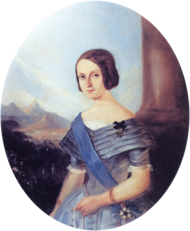
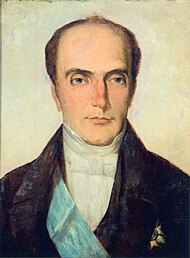
Under its current regulations, the Order consists of the Grand Master and six Classes of members:[11]
- Grand Collar: the recipient wears the adorned "Grand Collar", a chain from which the badge of the order is suspended. The recipient is also allowed to combine the wearing of the Grand Collar with any of the following insignia, or with both: the "Star" of the Order (a plaque modelled after the badge of the Order, to be worn on the left breast); and the Sash of the Order, that is proper to those of Grand Cross rank (a light blue sash, to be worn on the right shoulder). Awards of the Grand Collar are restricted to foreign Heads of State.
- Grand Cross: the recipient wears the Sash of the Order, and the badge of the Order hangs from the bottom part of that sash (given that the sash is worn on the right shoulder, the badge hangs close to the left leg, by the waist line). The recipient further wears the "star" of the Order, displayed on the left breast.
- Grand Officer: the recipient wears the badge of the Order around the neck suspended from a blue ribbon necklet, and the star of the order is displayed on the left breast.
- Commander: the recipient wears the badge of the order around the neck, suspended from a blue ribbon necklet.
- Officer: the recipient wears the badge of the Order on left breast suspended from a ribbon with a rosette.
- Knight: the recipient wears the badge of the Order on the left breast suspended from a simple ribbon.
| Ribbon bars | |||||
|---|---|---|---|---|---|
Notable recipients
[edit]Foreigners
[edit]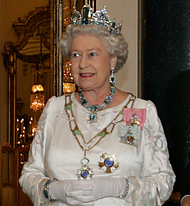
- 2024 –
 José Mujica (former President of Uruguay)[12]
José Mujica (former President of Uruguay)[12] - 2024 –
 Sergio Mattarella (President of Italy)[13]
Sergio Mattarella (President of Italy)[13] - 2023 –
 Marcelo Rebelo de Sousa (President of Portugal)[14]
Marcelo Rebelo de Sousa (President of Portugal)[14] - 2021 –
 Hamad Bin Isa Al Khalifa (King of Bahrain)[15]
Hamad Bin Isa Al Khalifa (King of Bahrain)[15] - 2021 –
 Tamim bin Hamad Al Thani (Emir of Qatar)[15][16]
Tamim bin Hamad Al Thani (Emir of Qatar)[15][16] - 2021 –
 Mohammed bin Zayed Al Nahyan (President of the United Arab Emirates and Ruler of the Emirate of Abu Dhabi)[15]
Mohammed bin Zayed Al Nahyan (President of the United Arab Emirates and Ruler of the Emirate of Abu Dhabi)[15] - 2021 –
 Mohammed bin Rashid Al Maktoum (Emir of Dubai)[15]
Mohammed bin Rashid Al Maktoum (Emir of Dubai)[15] - 2021 –
 Khalifa bin Zayed Al Nahyan (President of the United Arab Emirates)[15]
Khalifa bin Zayed Al Nahyan (President of the United Arab Emirates)[15] - 2021 –
 Iván Duque (President of Colombia)[17][18]
Iván Duque (President of Colombia)[17][18] - 2020 –
 Taro Aso (Prime Minister of Japan)
Taro Aso (Prime Minister of Japan) - 2020 –
 Shinzo Abe (Prime Minister of Japan)[19][20]
Shinzo Abe (Prime Minister of Japan)[19][20] - 2018 –
 Benjamin Netanyahu (Prime Minister of Israel)[21]
Benjamin Netanyahu (Prime Minister of Israel)[21] - 2017 –
 Okada Kōō (Spiritual leader of Sukyo Mahikari)[22]
Okada Kōō (Spiritual leader of Sukyo Mahikari)[22] - 2017 –
 Horacio Cartes (President of Paraguay)[23]
Horacio Cartes (President of Paraguay)[23] - 2017 –
 Stefan Zweig (novelist, playwright, journalist and biographer), posthumous award[24]
Stefan Zweig (novelist, playwright, journalist and biographer), posthumous award[24] - 2017 –
 Mauricio Macri (President of Argentina)[25]
Mauricio Macri (President of Argentina)[25] - 2016 –
 Rosen Plevneliev (President of Bulgaria)[26]
Rosen Plevneliev (President of Bulgaria)[26] - 2015 –
 Cristina Fernández de Kirchner (President of Argentina)[27]
Cristina Fernández de Kirchner (President of Argentina)[27] - 2015 –
 Enrique Peña Nieto (President of Mexico)[28][29]
Enrique Peña Nieto (President of Mexico)[28][29] - 2014 –
 Julio de Vido (politician)[30]
Julio de Vido (politician)[30] - 2013 –
 José Antonio Abreu (pianist)[31]
José Antonio Abreu (pianist)[31] - 2012 –
 Emmanuel Macron (later President of France)[32]
Emmanuel Macron (later President of France)[32] - 2011 –
 Georgi Parvanov (President of Bulgaria)[33]
Georgi Parvanov (President of Bulgaria)[33] - 2011 –
 María Ángela Holguín (Minister of Foreign Affairs of Colombia)[34]
María Ángela Holguín (Minister of Foreign Affairs of Colombia)[34] - 2010 –
 Bashar al-Assad (President of Syria)
Bashar al-Assad (President of Syria) - 2010 –
 Michel Suleiman (President of Lebanon)[35]
Michel Suleiman (President of Lebanon)[35] - 2009 –
 Nicolas Sarkozy (President of France)[36]
Nicolas Sarkozy (President of France)[36] - 2009 –
 Arturo Valenzuela (Assistant Secretary of State for Western Hemisphere Affairs)[37]
Arturo Valenzuela (Assistant Secretary of State for Western Hemisphere Affairs)[37] - 2007 –
 Anders Fogh Rasmussen (Prime Minister of Denmark)[38]
Anders Fogh Rasmussen (Prime Minister of Denmark)[38] - 2007 –
 Carl XVI Gustaf (King of Sweden)[39]
Carl XVI Gustaf (King of Sweden)[39] - 2007 –
 Silvia Sommerlath (Queen consort of Sweden)[39]
Silvia Sommerlath (Queen consort of Sweden)[39] - 2007 –
 Henri (Grand Duke of Luxembourg)[40]
Henri (Grand Duke of Luxembourg)[40] - 2007 –
 Maria Teresa (Grand Duchess consort of Luxembourg)[40]
Maria Teresa (Grand Duchess consort of Luxembourg)[40] - 2006 –
 Jacques Diouf (diplomat)[41]
Jacques Diouf (diplomat)[41] - 2004 –
 James Sherwood (businessman)[42]
James Sherwood (businessman)[42] - 2004 –
 Mohammed VI (King of Morocco)
Mohammed VI (King of Morocco) - 2003 –
 Beatrix (Queen of the Netherlands)[43]
Beatrix (Queen of the Netherlands)[43] - 2003 –
 Harald V (King of Norway)[44]
Harald V (King of Norway)[44] - 2003 –
 Sonja Haraldsen (Queen consort of Norway)[44]
Sonja Haraldsen (Queen consort of Norway)[44] - 2003 –
 Yasuo Tanaka (governor of Nagano)[45]
Yasuo Tanaka (governor of Nagano)[45] - 2003 –
 Ann Hartness (scholar)[46]
Ann Hartness (scholar)[46] - 2002 –
 Ismael Crespo (Professor at the University of Murcia, Murcia, Spain)[47]
Ismael Crespo (Professor at the University of Murcia, Murcia, Spain)[47] - 2002 –
 Aleksander Kwaśniewski (President of Poland)[48]
Aleksander Kwaśniewski (President of Poland)[48] - 1999 –
 Alberto Fujimori (President of Peru)[49]
Alberto Fujimori (President of Peru)[49] - 1999 –
 Albert Fishlow (professor)[50]
Albert Fishlow (professor)[50] - 1999 –
 Giovanni Sartori (political scientist)[51]
Giovanni Sartori (political scientist)[51] - 1998 –
 Ricardo Salgado (banker)[52]
Ricardo Salgado (banker)[52] - 1998 –
 Manuel Fraga (president of Galicia)[53]
Manuel Fraga (president of Galicia)[53] - 1996 –
 Jacques Chirac (President of France)[54]
Jacques Chirac (President of France)[54] - 1996 –
 António Guterres (Prime Minister of Portugal)
António Guterres (Prime Minister of Portugal) - 1996 –
 Stephan Schmidheiny (entrepreneur)[55]
Stephan Schmidheiny (entrepreneur)[55] - 1995 –
 Ronald Venetiaan (President of Suriname) [56]
Ronald Venetiaan (President of Suriname) [56] - 1991 -
 Sofía of Spain (Queen consort of Spain)
Sofía of Spain (Queen consort of Spain) - 1991 –
 Juan Carlos I (King of Spain)
Juan Carlos I (King of Spain) - 1990 –
 Václav Havel (President of Czechoslovakia)[57]
Václav Havel (President of Czechoslovakia)[57] - 1990 –
 Daisaku Ikeda (president of the Soka Gakkai)[58]
Daisaku Ikeda (president of the Soka Gakkai)[58] - 1987 –
 Mário Soares (President of Portugal)
Mário Soares (President of Portugal) - 1984 –
 Kiyoshi Sumiya (Ambassador of Japan)
Kiyoshi Sumiya (Ambassador of Japan) - 1978 –
 Charles, Prince of Wales (later Charles III, King of the United Kingdom and the other Commonwealth realms)
Charles, Prince of Wales (later Charles III, King of the United Kingdom and the other Commonwealth realms) - 1976 –
 Masayoshi Ōhira (Finance Minister of Japan)
Masayoshi Ōhira (Finance Minister of Japan) - 1976 –
 Valéry Giscard d'Estaing (President of France)[59]
Valéry Giscard d'Estaing (President of France)[59] - 1975 –
 Nicolae Ceausescu (President of Romania)
Nicolae Ceausescu (President of Romania) - 1974 –
 Margrethe II (Queen of Denmark)
Margrethe II (Queen of Denmark) - 1972 –
 Hugo Banzer (President of Bolivia)[60]
Hugo Banzer (President of Bolivia)[60] - 1972 –
 Alexander II Karađorđević (Crown Prince of Yugoslavia)
Alexander II Karađorđević (Crown Prince of Yugoslavia) - 1969 –
 Neil Armstrong (astronaut)[61]
Neil Armstrong (astronaut)[61] - 1969 –
 Michael Collins (astronaut)[61]
Michael Collins (astronaut)[61] - 1968 –
 Elizabeth II (Queen of the United Kingdom and the other Commonwealth realms)
Elizabeth II (Queen of the United Kingdom and the other Commonwealth realms) - 1965 –
 Mohammad Reza Pahlavi (Shah of Iran)
Mohammad Reza Pahlavi (Shah of Iran) - 1964 –
 Charles de Gaulle (President of France)[62]
Charles de Gaulle (President of France)[62] - 1964 –
 Felix Grant (radio presenter)[63]
Felix Grant (radio presenter)[63] - 1963 –
 Blaže Koneski (writer)[64]
Blaže Koneski (writer)[64] - 1963 –
 Ivan Rukavina (Army general)[64]
Ivan Rukavina (Army general)[64] - 1963 –
 Josip Broz Tito (President of Yugoslavia)
Josip Broz Tito (President of Yugoslavia) - 1962 –
 Prince Philip, Duke of Edinburgh (consort of the British monarch)
Prince Philip, Duke of Edinburgh (consort of the British monarch) - 1961 –
 Che Guevara (revolutionary)[65]
Che Guevara (revolutionary)[65] - 1961 –
 Yuri Gagarin (cosmonaut)
Yuri Gagarin (cosmonaut) - 1960 –
 Sarit Thanarat (Prime Minister of Thailand)[66]
Sarit Thanarat (Prime Minister of Thailand)[66] - 1960 –
 Bhumibol Adulyadej (King of Thailand)
Bhumibol Adulyadej (King of Thailand) - 1958 –
 Haile Selassie (Emperor of Ethiopia)
Haile Selassie (Emperor of Ethiopia) - 1956 –
 David Rockefeller (banker) [67]
David Rockefeller (banker) [67] - 1956 –
 Sukarno (President of Indonesia)
Sukarno (President of Indonesia) - 1955 –
 Hirohito (Emperor of Japan)[68]
Hirohito (Emperor of Japan)[68] - 1954 –
 Dwight D. Eisenhower (Supreme Commander WWII, President of the United States)
Dwight D. Eisenhower (Supreme Commander WWII, President of the United States) - 1954 –
 Vera Weizmann (wife of Chaim Weizmann, the first President of Israel)
Vera Weizmann (wife of Chaim Weizmann, the first President of Israel) - 1952 –
 Helen Keller (activist)[69]
Helen Keller (activist)[69] - 1952 –
 Eva Perón (First Lady of Argentina)[70]
Eva Perón (First Lady of Argentina)[70] - 1946 –
 Nelson Rockefeller (as Assistant Secretary of State for American Republic Affairs, later U.S. Vice President)
Nelson Rockefeller (as Assistant Secretary of State for American Republic Affairs, later U.S. Vice President) - 1944 –
 Charles Lyon Chandler (historian)[71]
Charles Lyon Chandler (historian)[71] - 1944 –
 Chiang Kai-shek (Chairman of the National Government of China)
Chiang Kai-shek (Chairman of the National Government of China) - 1944 –
 Ira C. Eaker (general of the United States Army Air Forces)[72]
Ira C. Eaker (general of the United States Army Air Forces)[72] - 1944 –
 Douglas Fairbanks Jr. (Naval officer)
Douglas Fairbanks Jr. (Naval officer) - 1940 –
 Eleazar López Contreras (President of Venezuela)[73]
Eleazar López Contreras (President of Venezuela)[73] - 1940 –
 Robert B. Williams (pilot)[74]
Robert B. Williams (pilot)[74] - 1940 –
 Conrad Carel Käyser (Marine officer and explorer)
Conrad Carel Käyser (Marine officer and explorer) - 1938 –
 Germán Busch (President of Bolivia)[75]
Germán Busch (President of Bolivia)[75] - 1935 –
 Jean Batten (aviator)[76]
Jean Batten (aviator)[76] - 1933 –
 Edward, Prince of Wales (later Edward VIII, King of the United Kingdom and the British Dominions, Emperor of India)
Edward, Prince of Wales (later Edward VIII, King of the United Kingdom and the British Dominions, Emperor of India) - 1884 –
 Nicholas II (Emperor of Russia)
Nicholas II (Emperor of Russia) - 1878 –
 Wilhem II (German Emperor and King of Prussia)
Wilhem II (German Emperor and King of Prussia) - 1873 –
 Carlos I (King of Portugal and the Algarves)
Carlos I (King of Portugal and the Algarves) - 1871 –
 Albert Edward, Prince of Wales, (later Edward VII, King of the United Kingdom and the British Dominions, Emperor of India)[77]
Albert Edward, Prince of Wales, (later Edward VII, King of the United Kingdom and the British Dominions, Emperor of India)[77] - 1867 –
 Prince Alfred (Duke of Saxe-Coburg and Gotha)
Prince Alfred (Duke of Saxe-Coburg and Gotha) - 1866 –
 Alexander III (Emperor of Russia)
Alexander III (Emperor of Russia) - 1865 –
 Maximilian I (Emperor of Mexico)
Maximilian I (Emperor of Mexico) - 1864 –
 Gaston, Count of Eu (French prince)
Gaston, Count of Eu (French prince) - 1861 –
 Luís I (King of Portugal and the Algarves)
Luís I (King of Portugal and the Algarves) - 1855 –
 Pedro V (King of Portugal and the Algarves)
Pedro V (King of Portugal and the Algarves) - 1852 –
 Domingo Faustino Sarmiento (President of Argentina)
Domingo Faustino Sarmiento (President of Argentina) - 1848 –
 Isabella II (Queen of Spain)
Isabella II (Queen of Spain) - 1838 –
 Fernando II (King of Portugal and the Algarves)
Fernando II (King of Portugal and the Algarves) - 1830 –
 Francis II & I (Holy Roman Emperor and Emperor of Austria)
Francis II & I (Holy Roman Emperor and Emperor of Austria) - 1830 –
 Marie Louise (Duchess of Parma, former Empress of the French)
Marie Louise (Duchess of Parma, former Empress of the French) - 1830 –
 Domingos Sequeira (artist)
Domingos Sequeira (artist) - 1826 –
 John Pascoe Grenfell (admiral)[78]
John Pascoe Grenfell (admiral)[78] - 1826 –
 Maria II (Queen of Portugal and the Algarves)
Maria II (Queen of Portugal and the Algarves) - 1823 –
 Thomas Cochrane, 10th Earl of Dundonald (admiral)[79]
Thomas Cochrane, 10th Earl of Dundonald (admiral)[79]
among others
Brazilians
[edit]- 1888 –
 Afonso Celso, Viscount of Ouro Preto (Prime Minister of Brazil)
Afonso Celso, Viscount of Ouro Preto (Prime Minister of Brazil) - 1876 –
 José Paranhos, Baron of Rio Branco (Diplomat)
José Paranhos, Baron of Rio Branco (Diplomat) - 1870 –
 José Paranhos, Viscount of Rio Branco (Prime Minister of Brazil)
José Paranhos, Viscount of Rio Branco (Prime Minister of Brazil) - 1870 –
 Deodoro da Fonseca (Marshal)
Deodoro da Fonseca (Marshal) - 1869 –
 Manuel Luís Osório, Marquis of Erval (Marshal)
Manuel Luís Osório, Marquis of Erval (Marshal) - 1866 –
 Francisco Manuel Barroso, Baron of Amazonas (Admiral)
Francisco Manuel Barroso, Baron of Amazonas (Admiral) - 1866 –
 Émile Mallet, Baron of Itapevi (Marshal)
Émile Mallet, Baron of Itapevi (Marshal) - 1852 –
 Manuel Marques de Sousa, Count of Porto Alegre (Lieutenant general)
Manuel Marques de Sousa, Count of Porto Alegre (Lieutenant general) - 1841 –
 Luís Alves de Lima e Silva, Duke of Caxias (Marshal)
Luís Alves de Lima e Silva, Duke of Caxias (Marshal) - 1841 –
 Honório Hermeto Carneiro Leão, Marquis of Paraná (Prime Minister of Brazil)
Honório Hermeto Carneiro Leão, Marquis of Paraná (Prime Minister of Brazil) - 1837 –
 Pedro de Araújo Lima, Marquis of Olinda (Regent of the Empire)
Pedro de Araújo Lima, Marquis of Olinda (Regent of the Empire) - 1824 –
 Carlos Frederico Lecor, Viscount of Laguna (Governor of the Cisplatina province)
Carlos Frederico Lecor, Viscount of Laguna (Governor of the Cisplatina province) - 1822 –
 Joaquim Xavier Curado, count of São João das duas Barras (minister of war)
Joaquim Xavier Curado, count of São João das duas Barras (minister of war)
among others
Cities
[edit]- 2016 –
 Medellín (Honorable support due LaMia Flight 2933 accident)[80]
Medellín (Honorable support due LaMia Flight 2933 accident)[80]
References
[edit]- ^ Ordem Nacional do Cruzeiro do Sul Archived 2016-03-03 at the Wayback Machine Banco Central do Brasil. Retrieved on 2010-10-10. (in Portuguese).
- ^ a b National Order of the Southern Cross Medal-Medaille. Retrieved on 2010-10-10.
- ^ a b Condecorações: Cruizeiro do Sul – Conselho Archived 2012-03-11 at the Wayback Machine Ministério das Relações Exteriores. Retrieved on 2010-10-10. (in Portuguese).
- ^ a b c d Condecorações: Cruizeiro do Sul – Histórico Archived 2010-09-02 at the Wayback Machine Ministério das Relações Exteriores. Retrieved on 2010-10-10. (in Portuguese).
- ^ White, William. Notes and queries, Volume 78. London: 1888, p. 173.
- ^ Even the short-lived republican Ordem de Colombo (Order of Columbus) that had been established by the Provisional Government of the Republic as a replacement to the Imperial Orders, was abolished when Congress promulgated Brazil's first republican Constitution on 24 February 1891, declaring all Orders abolished and stating that the Republic would maintain no Orders. Only after the 1891 Constitution had ceased to operate due to the 1930 Revolution was a republican honours system created, beginning with the recreation of the Order of the Southern Cross in 1932.
- ^ "- no title specified". Archived from the original on 2011-07-18.
- ^ "Cerimonial". Archived from the original on 2010-09-02. Retrieved 2010-10-10.
- ^ [1] Decree that "Reestablishes the National Order of the Southern Cross".
- ^ "Portal da Câmara dos Deputados".
- ^ Condecorações: Cruizeiro do Sul – Regulamento Ministério das Relações Exteriores. Retrieved on 2010-10-10. (in Portuguese).
- ^ "No Uruguai, Lula condecora Mujica com maior honraria brasileira". CNN Brazil. 5 December 2024.
- ^ "Mattarella in Visita di Stato in Brasile incontra il Presidente Lula". quirinale.it. 15 July 2024.
- ^ da Silva, Luiz Inácio Lula [@LulaOficial] (22 April 2023). "Reunião com o presidente de Portugal, Marcelo Rebelo de Sousa. Condecorei o amigo com a Ordem do Cruzeiro do Sul, uma comenda que nosso país atribui a personalidades estrangeiras" (Tweet) (in Brazilian Portuguese) – via Twitter.
- ^ a b c d e "Bolsonaro condecora líderes do Oriente Médio antes de viagem à região". UOL. 12 November 2021.
- ^ "17/11/2021 - Reunião Ampliada | (Doha - Qatar, 17/11/2021) P… | Flickr". 17 November 2021.
- ^ "Bolsonaro recebe presidente da Colômbia no Palácio do Planalto nesta terça-feira". 19 October 2021.
- ^ "DSC_7871 | Almoço em homenagem ao Excelentíssimo Senhor Iván… | Flickr". 19 October 2021.
- ^ "Governo brasileiro condecora ex-premiê Abe e vice-premiê Aso em Tóquio". Retrieved 9 July 2022.
- ^ "Shinzo Abe e Taro Aso são condecorados pelo Brasil". Retrieved 9 July 2022.
- ^ "Netanyahu in Brazil: Israel is forming an alliance with a superpower - Israel News - Jerusalem Post". Archived from the original on 2018-12-29.
- ^ "About Sukyo Mahikari|Sukyo Mahikari".
- ^ "Temer e Horácio Cartes reafirmam decisão de suspender Venezuela do Mercosul". Agência Brasil. 21 August 2017. Retrieved 22 August 2017.
- ^ "Diário Oficial da União". 13 April 2017. Retrieved 21 August 2017.
- ^ "Brazil and Argentina agree to move closer to Pacific Alliance". Agência Brasil. 7 February 2017. Retrieved 12 February 2017.
- ^ Ministério das Relações Exteriores - Decreto de 1º de Fevereiro de 2016. Published by Imprensa Nacional in Section 1 of the Diário Oficial da União on February 2, 2016. ISSN 1677-7042.
- ^ "Dilma Rousseff se emocionó al condecorar a Cristina con la "Orden del Sur de Brasil" - Los Andes Diario". www.losandes.com.ar. Archived from the original on 2015-07-22.
- ^ Ministério das Relações Exteriores - Decreto de 11 de Dezembro de 2015. Published by Imprensa Nacional in Section 1 of Diário Oficial da União of December 14, 2015. ISSN 1677-7042.
- ^ "Otorga Peña Orden del Águila Azteca a Rousseff; recibe la Cruz del Sur". Quadratin (in Spanish). 26 May 2015.
- ^ "De vido: "Argentina, Brasil, y la región están muchísimo mejor que hace diez años" - Télam - Agencia Nacional de Noticias". www.telam.com.ar. Archived from the original on 2014-05-17.
- ^ "El maestro Abreu fue galardonado con la Orden Nacional Cruzeiro do Sul por Dilma Rousseff". Archived from the original on 2013-05-13. Retrieved 2013-05-02.
- ^ "Decreto". 19 December 2012. Archived from the original on 5 January 2018. Retrieved 3 March 2019.
- ^ Presidente Dilma é condecorada com a mais alta ordem da Bulgária Archived 2016-03-03 at the Wayback Machine GazetaOnline. Retrieved on 2011-10-05. (in Portuguese).
- ^ "EBC".
- ^ "Decorations and Medals". Archived from the original on 13 April 2012. Retrieved 9 February 2017.
- ^ "G1 > Mundo - NOTÍCIAS - Lula e Sarkozy reforçarão associação militar entre França e Brasil".
- ^ United States Department of State
- ^ "Pág. 7. Seção 1. Diário Oficial da União (DOU) de 06 de Setembro de 2007". 5 September 2007. Retrieved 21 February 2017.
- ^ a b "6280020 - Search".
- ^ a b DECRETO DE 3 DE DEZEMBRO DE 2007 - website JusBrasil
- ^ "Dr Jacques Diouf, Director-General Food and Agriculture Organization of the United Nations (FAO)". FAO website. Food and Agriculture Organization of the United Nations (FAO). July 2007. Archived from the original on 2009-05-18. Retrieved 2009-09-26.
- ^ "Chairman James Hurlock and Founder James Sherwood to Retire from Orient-Express Board of Directors" (Press release).
- ^ "Diário Oficial da União". 19 March 2003. Retrieved 9 February 2017.
- ^ a b "Diário Oficial da União". 7 October 2003. Retrieved 9 February 2017.
- ^ "The Japan Times Online". www.japantimes.co.jp. Archived from the original on 21 April 2003. Retrieved 11 January 2022.
- ^ "Ann Hartness to receive Brazil's National Order of the Southern Cross". News releases. Nettie Lee Benson Latin American Collection, University of Texas. April 10, 2003. Archived from the original on June 30, 2016. Retrieved 2009-09-26.
- ^ "Diário Oficial da União". 28 October 2002. Retrieved 3 March 2017.
- ^ "Diário Oficial da União". 17 April 2002. Retrieved 20 February 2017.
- ^ "UOL - Brasil Online - FHC condecora Fujimori e se reúne com empresários 22/07/99 10h07".
- ^ "Viu a receita de Albert Fishlow para o Brasil crescer? | EXAME.com". Archived from the original on 2015-08-13.
- ^ "'Santa': Consegnato al politologo Sartori il premio Isaiah Berlin". 18 September 2013. Archived from the original on 6 August 2020. Retrieved 2 March 2015.
- ^ "Ricardo Salgado: O banqueiro há mais tempo no ativo".
- ^ "Folha de S.Paulo - Rei chama de querido FHC - 19/05/98".
- ^ "Diário Oficial". 29 July 1996. Retrieved 14 September 2017.
- ^ "A maldição do amianto". 6 January 2014.
- ^ "Curriculum Vitae Runaldo R. Venetiaan". Cabinet of the President of the Republic of Suriname (in Dutch). Archived from the original on 2006-11-02. Retrieved 2006-11-02.
- ^ "State Decorations". Retrieved 9 February 2017.
- ^ "Curriculum Vitae | Daisaku Ikeda Website".
- ^ "Viagem do PR Geisel à França" (PDF). Retrieved 19 January 2019.
- ^ "Brazilian President Emilio Garrastazu Medici decorates Bolivian".
- ^ a b "Armstrong lembrou Dumont como pioneiro da aviação". Estadão. 26 August 2012. Retrieved 2 September 2018.
- ^ "Ressaltada a amizade frança–brasil". Correio da Manhã. 14 October 1964. Retrieved 2 April 2017.
- ^ "Special feature | Fifty years later, remembering a golden album by Stan Getz and Charlie Byrd -". 22 February 2012.
- ^ a b "DOU 19/09/1963 - Pág. 4 - Seção 1 - Diário Oficial da União". Archived from the original on 2012-12-08.
- ^ "Janio condecora Guevara". Folha de S. Paulo. 20 August 1961. Retrieved 2010-08-24.
- ^ อาจศึก ดวงสว่าง. การพัฒนาลิกไนท์ในประเทศไทย. 2507
- ^ "Mala Diplomática". Correio da Manhã. 4 May 1956. Retrieved 16 February 2017.
- ^ "Viagem do Presidente Geisel ao Japão". September 1976. Retrieved 15 May 2018.
- ^ "27 de junho, nasce Helen Keller, a mulher que viu para além da cegueira | 2014/06/26/". Archived from the original on 2015-04-02. Retrieved 2015-03-02.
- ^ "Condecorada com a Ordem Nacional do Mérito a Senhora Eva Peron". A Noite. 23 April 1952. Retrieved 30 December 2018.
- ^ Avenius, Sheldon H. Jr. (April 1967). "Charles Lyon Chandler: A Forgotten Man of Inter-American Cultural Relations". Journal of Inter-American Studies. 9 (2): 169–183. doi:10.2307/165091.
- ^ Ira C. Eaker#Awards and decorations
- ^ "Condecorados com a Ordem do Cruzeiro do Sul". O Imparcial. 11 February 1940. Retrieved 21 March 2017.
- ^ "Major General Robert B. Williams". U.S. Air Force Official Website. U.S. Air Force. Archived from the original on 2012-07-22. Retrieved 2010-03-31.
- ^ Montenegro, Carlos (2015). Baptista Gumucio, Mariano (ed.). Germán Busch y otras páginas de historia de Bolivia (in Spanish) (2nd ed.). La Paz: Librería Editorial LewyLibros. p. 303 – via the Internet Archive.
- ^ My Life, by Jean Batten, George G. Harrap & Co. Ltd., 1938
- ^ Burke's Peerage, Baronetage and Knightage, Burke's Peerage Ltd, 1910, p. 12
- ^ Stewart, Charles Samuel, Brazil and La Plata, the personal record of a cruise, p. 335
- ^ "Lorde Cochrane, o turbulento Marquês do Maranhão" (PDF). Revista Navigator. Archived from the original (PDF) on 13 April 2020. Retrieved 9 February 2018.
- ^ "Governo condecora colombianos que resgataram vítimas da Chapecoense". 16 December 2016.
External links
[edit]- Ordem Nacional do Cruzeiro do Sul – official website of the Brazilian Ministry of External Relations (Portuguese)
- Orders and Decorations of all Nations by Robert Werlich and Jose Luiz Silva Preiss-Porto Alegre-RS-Brazil





